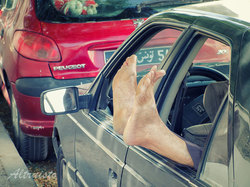
Thanks to overeating, eating the wrong stuff, and not exercising, American waistlines creep wider each year, which might have one advantage: stimulating the economy, thanks to the need for larger sized clothing. It’s also reflected in diabetes. The recent (Nov-Dec) issue of Podiatry Management focused on diabetes. Obesity and diabetes know each other well. If you want a bird’s eye view of this serious problem – the photos are not pretty – go to the journal’s website. Are podiatrists seeing more diabetic, non-healing wounds of the feet? You betcha.
Another problem, also growing rapidly, is the average person’s perception of American life expectancy. Many, many articles claim that we’ll live longer and longer. Really? Here’s a letter I wrote to Barron’s about a column on this topic. The author claimed our average 65-year-old could expect to live 20 more years. Dead wrong, pardon the pun
Dead Wrong: Other Voices – To Barrons – sent 11-14
Mr. Greenwald’s column stated that “at age 65, the average life expectancy is about 20 years.” Wrong, unless he was referring to the Japanese, whose men live to 85 and whose women top 87. Americans, on the other hand, live much shorter lives: men – 77.4 and women – 82.2, a sad statement for a country that spends more per capita on health than any other country. Americans, with an average life expectancy of 79.8, rank 34, according to WHO data – behind such countries as Slovenia, Iceland, San Marino, and Andorra.
There are reasons for this. A big one, no pun intended, is obesity. Although statistics tell us that about three-quarters of Americans are overweight or obese, the figure is closer to ninety percent. Just sit in a shopping mall and observe for fifteen minutes. And obesity is steadily rising, even in children, making experts predict that the youngest generation will have a lower life expectancy than our oldest one.
To counteract the ills of obesity – cancer, diabetes, and heart disease – big pharma produces meds to fight these evils, allowing obese Americans to live longer, even though they must deal with disease and its afflictions. Alan Abelson got it right – “the eat, drink, and get-sick industries are all doing well.”
LifeNuts, a community-based vitality and longevity program, teaches a lifestyle that lowers health care costs and points to a long life, filled with happiness instead of medications and wheelchairs.

 RSS Feed
RSS Feed